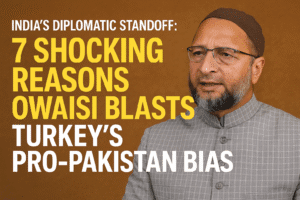India’s Diplomatic Standoff: 7 Shocking Reasons Owaisi Blasts Turkey’s Pro-Pakistan Bias
AIMIM leader Asaduddin Owaisi has urged Turkey to reassess its diplomatic support for Pakistan, emphasizing India’s historical and cultural ties with Ankara. Highlighting India’s 220-million-strong Muslim population—surpassing Pakistan’s total populace—he challenged the narrative of Pakistan as a singular voice for South Asian Muslims. Owaisi cited overlooked connections, including contributions by Indian princely states to Turkey’s İşbank and the use of Turkish in Ladakh’s education system until the 1990s.
His remarks coincide with growing Indian public backlash, including suspended business licenses for Turkish firms and universities severing academic ties over Ankara’s pro-Pakistan stance on Kashmir. The backlash underscores domestic frustration with Turkey’s perceived ingratitude, given India’s aid during Turkey’s 2023 earthquake. Owaisi’s push reframes India’s Muslim identity as a soft-power asset, countering Pakistan’s geopolitical claims while spotlighting India’s pluralism. The situation signals India’s diminishing patience for diplomatic ambivalence as its global influence rises.

India’s Diplomatic Standoff: 7 Shocking Reasons Owaisi Blasts Turkey’s Pro-Pakistan Bias
As tensions between India and Pakistan persist, a new front has emerged in India’s diplomatic landscape, with Turkish support for Pakistan drawing sharp criticism from Indian leaders. All India Majlis-e-Ittehadul Muslimeen (AIMIM) chief Asaduddin Owaisi recently called on Turkey to reassess its alignment with Pakistan, emphasizing India’s historical ties with Ankara and its sizable Muslim population—a demographic often overlooked in regional geopolitics.
Owaisi’s Historical and Demographic Counterargument
Speaking at a public forum, Owaisi highlighted Turkey’s longstanding cultural and economic connections with India, urging Ankara to move beyond its reflexive support for Pakistan. “Turkey must recognize that India is home to 220 million Muslims—more than Pakistan’s entire population,” he asserted, challenging the narrative that Pakistan holds exclusive claim to representing Muslim interests in South Asia.
The Hyderabad MP underscored lesser-known historical links, such as the contributions of princely states like Hyderabad and Rampur to Turkey’s İşbank in the early 20th century. He also noted that until the 1990s, Turkish was taught in Ladakh’s schools, and until the 1920s, pilgrims from northern Turkey traversed Ladakh to reach Mumbai for Hajj. “These ties run deeper than contemporary politics,” Owaisi stressed, implying that Turkey’s stance overlooks shared heritage.
Rising Public Backlash: Boycotts and Academic Suspensions
Owaisi’s remarks come amid growing public pressure in India to curtail engagement with Turkey and Azerbaijan, both of which have vocally supported Pakistan on Kashmir. The backlash has translated into tangible actions:
- Economic Impact: Celebi Aviation, a Turkish ground-handling firm operating in Indian airports, had its license suspended, signaling potential economic repercussions.
- Academic Freeze: Prestigious institutions like Jawaharlal Nehru University (JNU) and Sharda University severed ties with Turkish counterparts, halting student exchanges and joint research programs. Sharda University explicitly cited “national interests” in its decision.
- Public Sentiment: Social media campaigns and canceled tourism plans reflect grassroots frustration, with many Indians questioning Turkey’s “reciprocity” after India’s aid during Ankara’s 2023 earthquake crisis.
Why Turkey’s Pakistan Stance Stings India
Turkey and Pakistan have historically aligned on issues like Kashmir, with Ankara echoing Islamabad’s calls for international intervention. However, India views this as a strategic slight, given its efforts to strengthen bilateral trade ($10 billion annually) and cultural ties with Turkey. Analysts suggest Owaisi’s demographic argument aims to disrupt the perception of Pakistan as the sole voice of South Asian Muslims—a narrative India seeks to counter as it positions itself as a pluralistic democracy.
The Bigger Picture: Soft Power and Strategic Messaging
Owaisi’s invocation of India’s Muslim population isn’t merely rhetorical. It reflects a broader strategy to leverage India’s diversity as a soft-power tool. By highlighting Turkey’s historical connections to Indian Muslims, he positions India as a bridge between the Islamic world and the West—a role Pakistan has long sought to claim.
However, critics argue that domestic politics also play a role. With rising Hindu nationalism, Owaisi’s emphasis on Muslim inclusion may aim to counter marginalization narratives while asserting India’s secular credentials globally.
Unanswered Questions and Future Implications
Neither Turkey nor Pakistan has officially responded to Owaisi’s remarks or the boycott movement. Yet, the situation underscores a shifting dynamic: as India’s global influence grows, its tolerance for perceived diplomatic slights may diminish. How Turkey navigates its ties with both India and Pakistan—balancing historical camaraderie with contemporary economic interests—will be critical.
For now, Owaisi’s message serves as a reminder: In the complex chessboard of international relations, demographics and shared history can be as potent as political alliances
You must be logged in to post a comment.